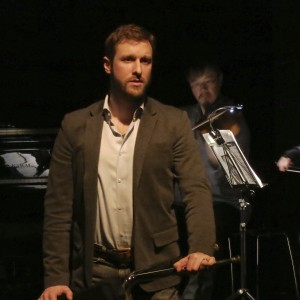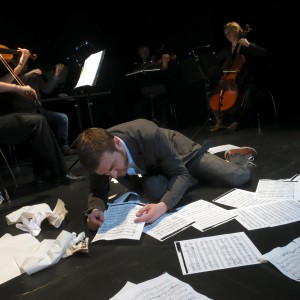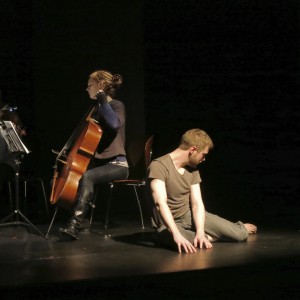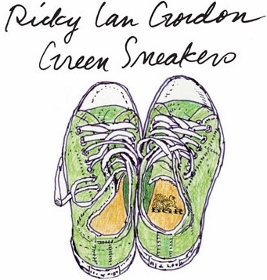GRIEF TURNS TO POETRY AND MUSIC
Composer and poet Ricky Ian Gordon’s partner, Jeffrey Michael Grossi, died of AIDS in 1996, at the age of 32. In response, Gordon created, among his many other works, Dream True (1998 – book and lyrics Tina Landau) and the song cycle Orpheus and Euridice (2005), which Long Beach Opera produced in the city’s Olympic swimming pool.
In 2008, he wrote an opera/song cycle, Green Sneakers. Set to poetry that Gordon himself wrote over the course of a couple of days soon after Jeffrey’s death, the piece evolved from a fifteen minute purely instrumental work into a 70-minute serenata (or theatrical song cycle) for baritone, string quartet, piano and empty chair (in which the spirit of Jeffrey can be accommodated).
Recorded by Miami String Quartet with New York-based baritone Jesse Blumberg – chosen by Gordon himself based on Blumberg’s powerfully evocative performance in Gordon’s opera The Grapes of Wrath (2010) – Green Sneakers recently received a haunting and poignant West Coast premiere at the Southside Theater in Fort Mason, presented by Michael Colbruno, promoter of Bay Area baroque and new  music. Blumberg has reprised his role, but is now accompanied by the San Francisco-based Del Sol Quartet (Blumberg will return with the show to Lincoln Center on April 6).
music. Blumberg has reprised his role, but is now accompanied by the San Francisco-based Del Sol Quartet (Blumberg will return with the show to Lincoln Center on April 6).
The title refers to a pair of green sneakers which caught Gordon’s eye while grieving over Jeffrey’s death. The shoes were impulsively purchased by Gordon for Jeffrey, who was in failing health but well enough at the time to join his lover in Houston during rehearsals for Gordon’s first opera (commissioned by Houston Grand Opera, then under the direction of the visionary David Glockley, who coincidentally is now the head of the San Francisco Opera). The same day, Jeffrey was so ill that he had to fly back home to New York, missing Gordon’s big opening night. Upon seeing that pair of green sneakers after Jeffrey’s passing, the poems flowed out of Gordon in a rush, and were set aside because they were so personal.
The poems record the range of emotions Gordon felt in the last weeks of Jeffrey’s life – from grief, pain and guilt to succor in the good memories. The seventeen emotionally rich poems are all straight-forward and honest, even describing Gordon’s impatience or preoccupation in composing while neglecting his partner. As such, the song cycle – surely the only one involving a man singing about his dying husband – is a profound experience for composer, performer and audience, to whom Gordon presents the last night of his lover’s life.
Dallas-Ft. Worth-based opera and stage director/choreographer John De Los Santos’ thoroughly considered staging offered a narrative within the music and text’s emotional diversity. Right at the start, a loving commitment was communicated when Blumberg looked at the empty chair and adjusted its position slightly to give Jeffrey’s spirit a better view of the rest of the stage. After moments of  painful reflection, Blumberg sings, “If only someone could have told me it would be like the blink of an eye.” This sets the elegiac and reflective tone of the remainder of the opera.
painful reflection, Blumberg sings, “If only someone could have told me it would be like the blink of an eye.” This sets the elegiac and reflective tone of the remainder of the opera.
For the most part, the string quartet’s accompaniment is similarly straight-forward, although the musical idiom ranges from beautiful harmonies tracking the singer’s line to chromatic and difficult lines as a counterpoise to the baritone, who has to replicate the discordant feelings of a survivor in both a beautiful and hard-hitting way. Blumberg was frightening in his intensity while simultaneously being self-contained and thoughtful through his lyricism. He is a natural singing actor, and one has to be in awe at his stamina in performing seventeen very different songs in a setting that the director made both domestic and abstract.
At one point, the string quartet played an instrumental interlude during which Blumberg lithely executed De Los Santos’ abstract choreography. Blumberg’s supple style and complete control over his body were an even greater revelation to me of his ability to control the stage. While one patron mentioned afterwards that the dance was distracting, I believe it added another dimension to a role limited until then to singing and description; besides, it was beautifully performed.
The four instrumentalists remained behind the singer almost until the end, but in key moments, De Los Santos had them interacting with Blumberg, such as in the penultimate song, “Provincetown,” when the cellist gets up  and moves to comfort the singer by placing her arm around his shoulder while he is on the ground, emotionally drained.
and moves to comfort the singer by placing her arm around his shoulder while he is on the ground, emotionally drained.
Also on stage was a piano, with its open keyboard facing the audience, leaving us to wonder why it wasn’t being used. But after “Provincetown,” the musicians arose and quietly moved the grand piano to the front of the stage as if in a solemn ritual. After Blumberg played a brief melody, the players – this time standing over him – began the last song, which alone of all these poems predated Jeffrey’s death. “Sleep,” a lullaby written for Jeffrey before his death, is such a beautiful ballad that it’s difficult to choke back tears, especially coming as a comforting lullaby after such alternately harrowing and poignant songs. The story goes that when it was first performed as a surprise for Jeffrey, the ailing man leaned over to comfort someone else in the audience who was sobbing uncontrollably. (A YouTube video displays Blumberg’s beautiful rendition with Gordon standing at the piano.)
Indeed, reminiscing about this moment elicits tears yet again for me, the very hallmark of an intense, engaging and moving evening about reinventing life after the death of one most loved.
photos by Michael Colbruno
Green Sneakers
played February 19, 2013
Southside Theater/Fort Mason
CD available at Blue Griffin
plays next in New York on April 6, 2013
American Songbook series
Lincoln Center (Stanley H. Kaplan Penthouse)
for tickets, visit http://americansongbook.org/

